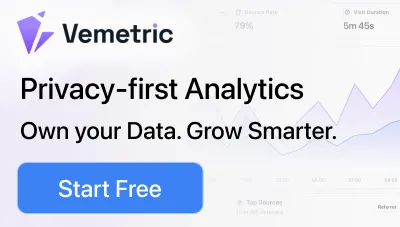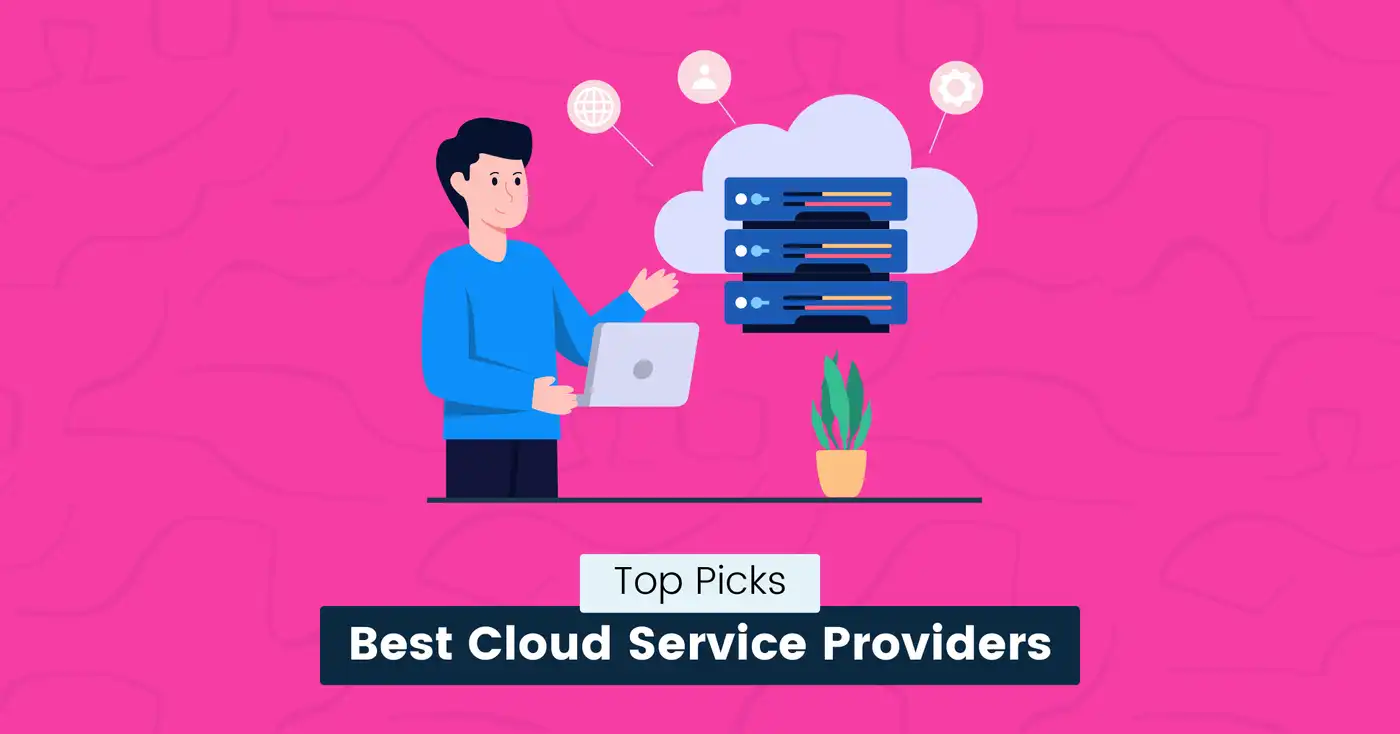
15 Best Cloud Service Providers (2024)
Cloud computing has changed the way businesses operate and manage IT resources.
As cloud providers continue to innovate and expand their services, it is a golden opportunity to leverage the cloud for competitive advantage.
With so many cloud service providers in the market and new ones emerging constantly, it can be difficult to determine which is best for your business or development purposes.
We spent 48 hours comparing the top cloud service providers to help you find the best cloud solution for your business needs.
Let’s get started.
snappify will help you to create
stunning presentations and videos.
What is a Cloud Service Provider?
A Cloud Service Provider, or CSP, is a company that offers scalable cloud computing services, such as online storage, platforms, or applications, over the Internet.
Cloud service providers have their own data centers to host cloud computing-based infrastructure and platform services, which you can access via pay-as-you-go subscription models.
Types of Cloud Service Providers:
There are three main types of cloud service providers:
- IaaS (Infrastructure as a Service): This provides access to infrastructure computing resources like virtual machines, cloud storage, and networking.
- PaaS (Platform as a Service): It provides a platform to develop, run, and manage applications and is used to incorporate development tools, operating systems, and middleware into the application stack.
- SaaS (Software as a Service): SaaS solutions are probably the most well-known and provide access to cloud-based tools and software applications over the Internet.
Key Benefits of Using A CSP
Here are some benefits of using cloud providers instead of building on-premises:
- Agility: CSP provides services to maintain, repair, and secure hardware and software so your team can focus on development and speed up time to market.
- Scalability: Public cloud providers offer resources that can be scaled to meet business-changing needs, such as high demand or unexpected traffic increases.
- Cost-effectiveness: A pay-as-you-go model allows you to avoid the capital expense of buying IT infrastructure and only pay for what you use.
- Reliability: CSPs guarantee high levels of uptime and performance, often backed by service-level agreements (SLAs) to provide a reliable cloud infrastructure.
- Accessibility: Services and resources can be accessed from anywhere with an internet connection to do remote work easily.
- Disaster Recovery: CSPs offer faster recovery of services due to the distributed nature of cloud infrastructure.
Top Cloud Service Providers
Here are the top cloud service providers worth checking out.
Amazon Web Services (AWS)
Amazon Web Services is the leading cloud platform offering IaaS, PaaS, and SaaS solutions.
It provides 200 fully-featured services with millions of users globally and a market share of 31%.
AWS cloud solutions and services include computing, storage, databases, developer tools, IoT, machine learning, and artificial intelligence.
Key features:
- Highly scalable infrastructure and secure cloud computing environment for startups and large enterprises.
- AWS has a global network of data centers, providing high availability and low latency. It serves 245 countries with 105 availability zones, and 135 direct connect locations.
- Comprehensive security services and support for 143 security standards and compliance certifications.
- Access and manage thousands of third-party integrations through the AWS Marketplace.
Best for:
IAAS and enterprise-level global cloud services.
Pricing:
- AWS offers a free tier for new customers.
- Pay-as-you-go pricing model based on service usage.
Microsoft Azure
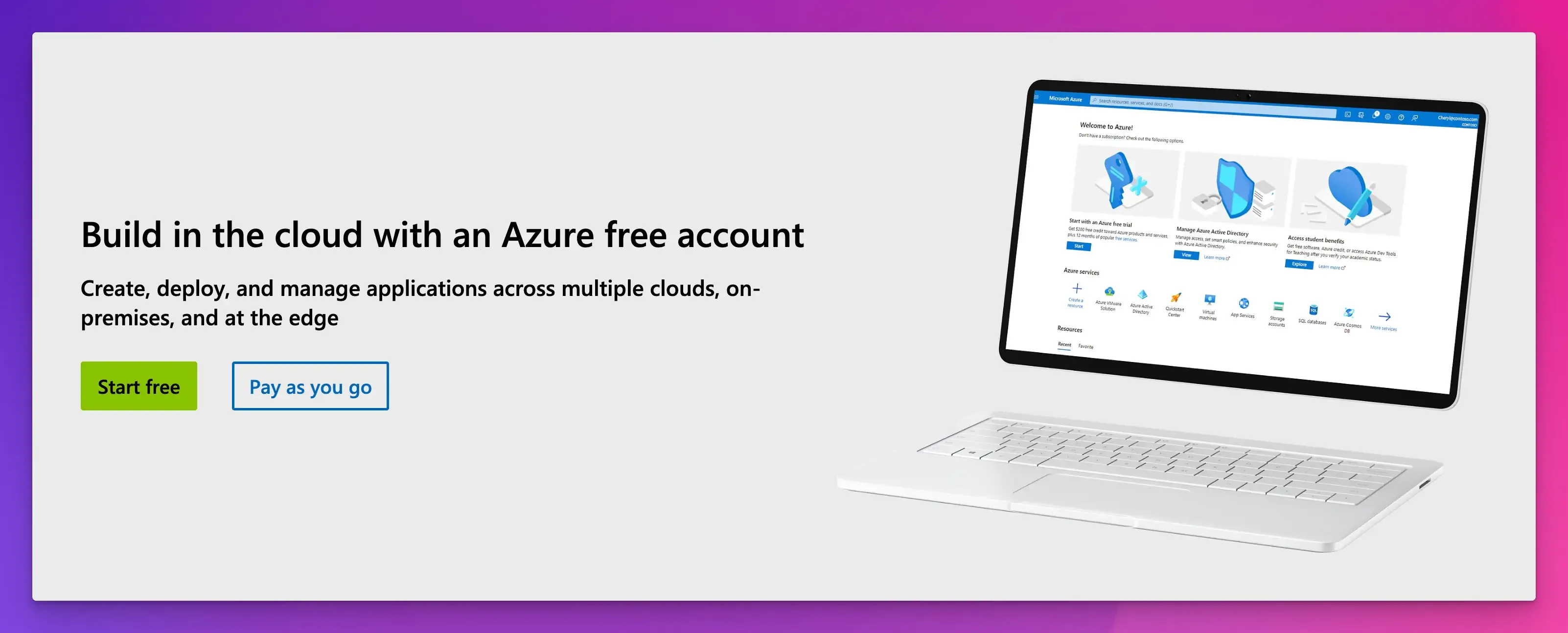
Microsoft Azure is the second leading cloud computing platform with a market share of 24%.
It offers over 200 products to help you build, run, and manage applications across multiple clouds or on-premises.
Azure Cloud provides artificial intelligence, machine learning, and hybrid cloud capabilities.
Key features:
- IaaS, PaaS, SaaS, and edge and serverless computing.
- Global reach with 60+ regions and over 185 global network points, providing high availability and low latency.
- Highly secure cloud infrastructure with built-in security controls and threat intelligence.
- Azure DevOps for collaboration, version control, agile planning, and CI/CD.
- Integration with Microsoft products like Windows, SQL Server, Office 365, and third-party apps in the Azure Marketplace.
Best for:
Hybrid cloud computing across on-premises, multi-cloud, and edge environments.
Pricing:
- New customers can get free services for the first 12 months.
- Pay-as-you-go pricing model available on request.
Google Cloud Platform (GCP)
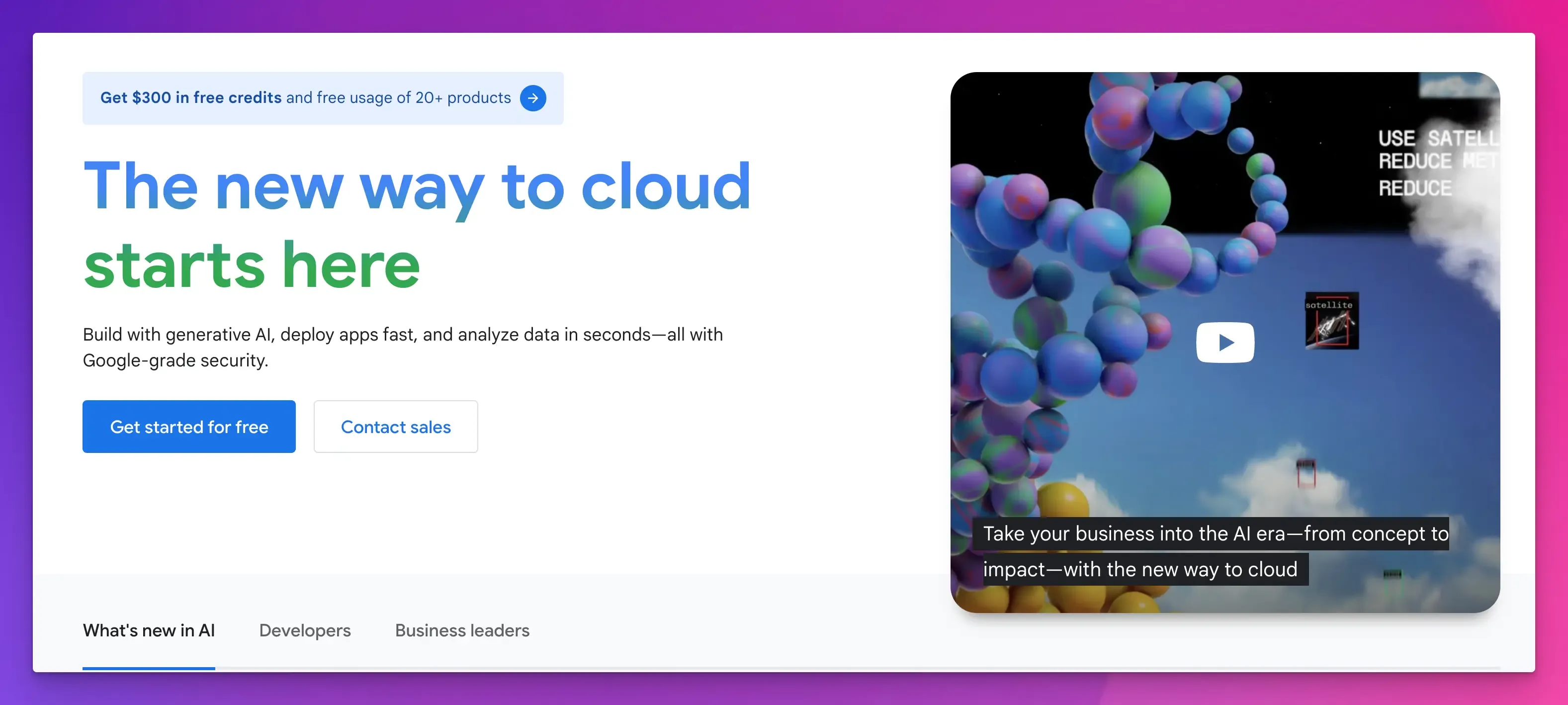
Google Cloud is another powerful cloud computing platform with a market share of 11%.
GCP offers a suite of cloud computing services running on the same infrastructure as its end-user products, such as Google Search, Gmail, and YouTube.
Key features:
- Comprehensive range of data-driven cloud services: AI, machine learning, computing, storage, networking, developer tools, data analytics, and Kubernetes.
- GCP provides public cloud services in 200+ countries and 121 availability zones with 187 network edge locations.
- Cloud security with intel-driven and AI-powered technology.
- Smooth integration with Google products and third-party apps through Google Cloud Marketplace.
Best for:
Data analytics and machine learning with powerful data processing and AI services.
Pricing:
- Free tier available with limited access to Google products.
- Pay-as-you-go pricing model based on product and usage.
DigitalOcean
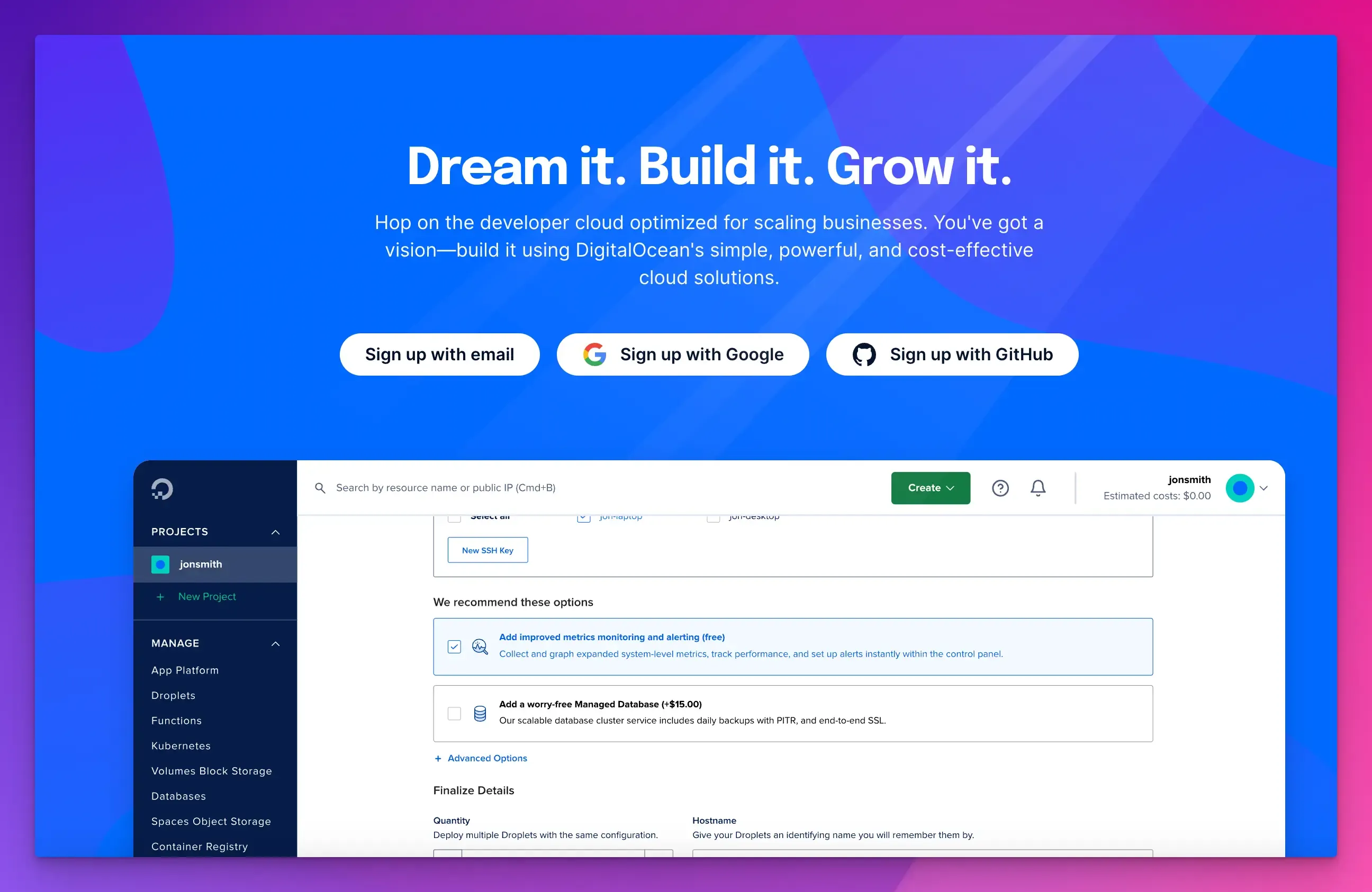
DigitalOcean is a cloud service provider offering developers simple yet affordable cloud computing.
It provides developers with a platform to deploy, manage, and scale applications easily.
Its user-friendly interface and high performance make it a popular choice for small- and medium-sized businesses.
Key features:
- It offers various cloud services, including computing, developer tools, AI and machine learning, storage, networking, and databases.
- Kubernetes service for deploying and scaling containerized apps.
- Developer resources, tools, apps, wrappers, APIs and more.
- Cloud hosting with one-click deployment.
- Access pre-configured apps and tools in the DigitalOcean Marketplace.
Best for:
Developers looking for simple, affordable, and scalable cloud solutions.
Pricing:
It offers a large variety of plans starting from $4 per month.
Alibaba Cloud
Alibaba Cloud is one of the largest cloud providers in Asia.
It offers global cloud services for large-scale data processing, AI, and e-commerce solutions to large and small enterprises, developers, and government organizations.
Key features:
- Alibaba’s cloud platform provides services such as elastic computing, storage, containers, serverless computing, databases, data analytics, and artificial intelligence.
- Networking services, including virtual private cloud and content delivery network.
- Global reach with 89 availability zones and data centers in more than 200 countries.
Best for:
Businesses looking for reliable cloud services with a strong presence in Asia.
Pricing:
- Free tier available.
- Pay-as-you-go pricing model based on your needs.
IBM Cloud
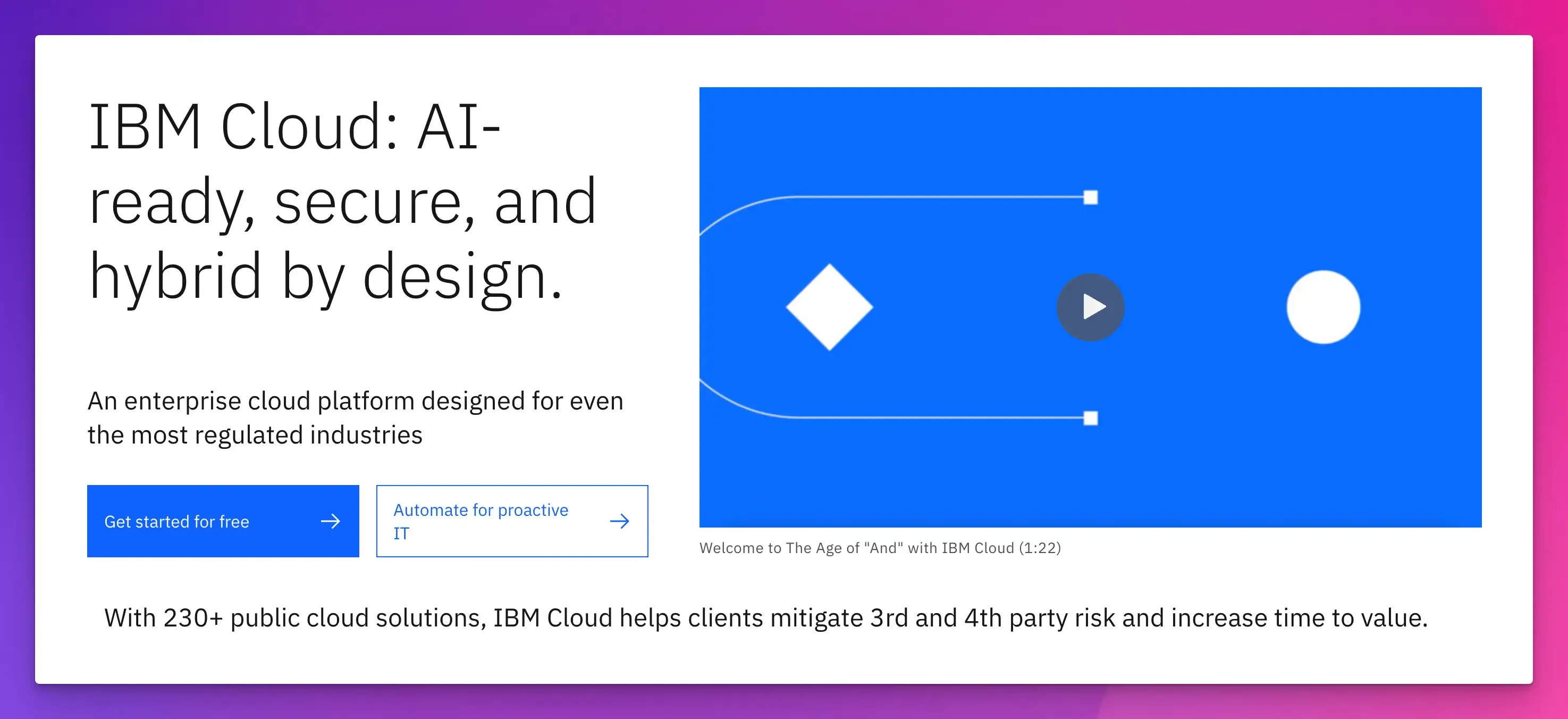
IBM Cloud offers cloud computing services for businesses to build, deploy, and manage applications in the cloud.
It is best known for IaaS, cloud migration services, and enterprise-grade security.
IBM Cloud is good for on-premises, edge, and cloud computing, providing solutions across public, multi-cloud, and hybrid cloud environments.
Key features:
- 230+ public cloud solutions, including flexible computing and storage options, networking, databases, and managed Kubernetes service, analytics, AI, and machine learning.
- AI-powered intelligent automation for IT operations.
- Cybersecurity features include data encryption, authentication, and advanced AI threat detection.
- DevOps tools for CI/CD, application monitoring, and development.
Best for:
AI, machine learning, hybrid cloud solutions, and advanced security and compliance features.
Pricing:
- Free plan available.
- Pay-as-you-go model based on products.
Rackspace
Rackspace is a managed cloud computing company that provides cloud and hosting services in multi-cloud environments, including public, private, and hybrid clouds.
Key features:
- Manage popular cloud platforms like AWS, Microsoft Azure, Google Cloud Platform, and OpenStack.
- Comprehensive managed services, including cloud optimization, adoption, and migration.
- SaaS lifecycle management and support for modern applications, including ERP, CRM, e-commerce, and custom solutions.
- Advanced security features for threat detection and vulnerability management.
Best for:
Fully managed cloud services and 24/7 support.
Pricing:
Custom pricing options available upon request.
Oracle Cloud
Oracle Cloud offers full-suite applications (SaaS), platforms (PaaS), and infrastructure (IaaS) services.
Oracle Cloud Infrastructure (OCI) is a distributed cloud that provides customers with flexible cloud services, including multi-cloud, public, private, and dedicated cloud.
Key features:
- High-performance infrastructure with computing, storage, networking services, managed Kubernetes, serverless computing, and IoT.
- High availability with services from 48 public cloud regions.
- Advanced AI and machine learning with AI code assist in building intelligent applications.
- Autonomous database that drives, repairs, and secures itself and automates tasks to improve performance.
- Integrations with popular tools and apps include Salesforce, Microsoft, Snowflake, Workday, and more.
Best for:
Enterprise-level cloud infrastructure and comprehensive cloud applications.
Pricing:
- Free tier available.
- Pay-as-you-go model based on usage.
Tencent Cloud
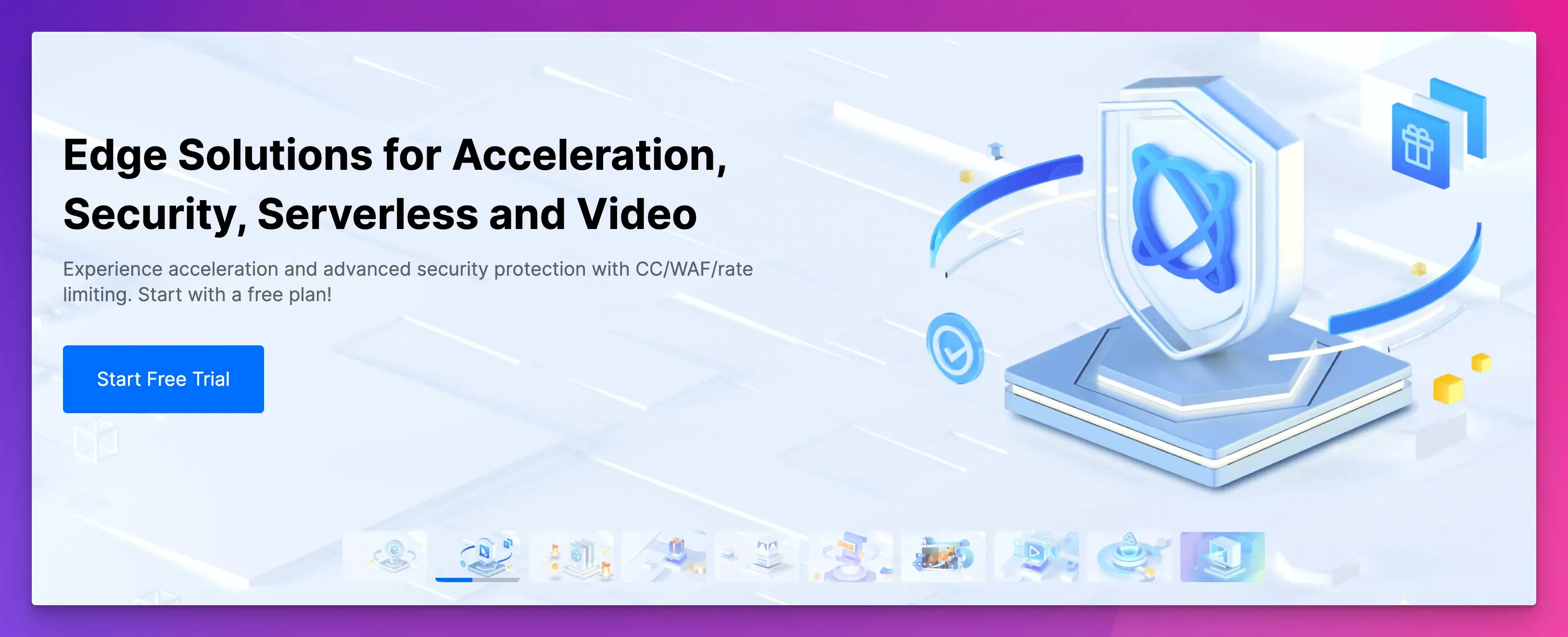
Tencent Cloud is China’s second-largest cloud service provider, behind Alibaba Cloud.
It offers a wide range of cloud services for both the Chinese and international markets, including computing, storage, databases, AI, and networking.
Key features:
- High-performance cloud computing service with scalable virtual machines.
- With Tencent Cloud Lighthouse, developers can build and deploy web apps, mini-games, e-commerce apps, etc.
- Multimedia solutions with gaming and live streaming applications.
- Global reach with 70 availability zones in 26 regions.
- Advanced security features with Anti-DDoS, web application firewall, and cloud access management.
Best for:
Businesses looking to expand into the Chinese market.
Pricing:
- Free trial available.
- Pricing depends on product and usage.
Cloudflare
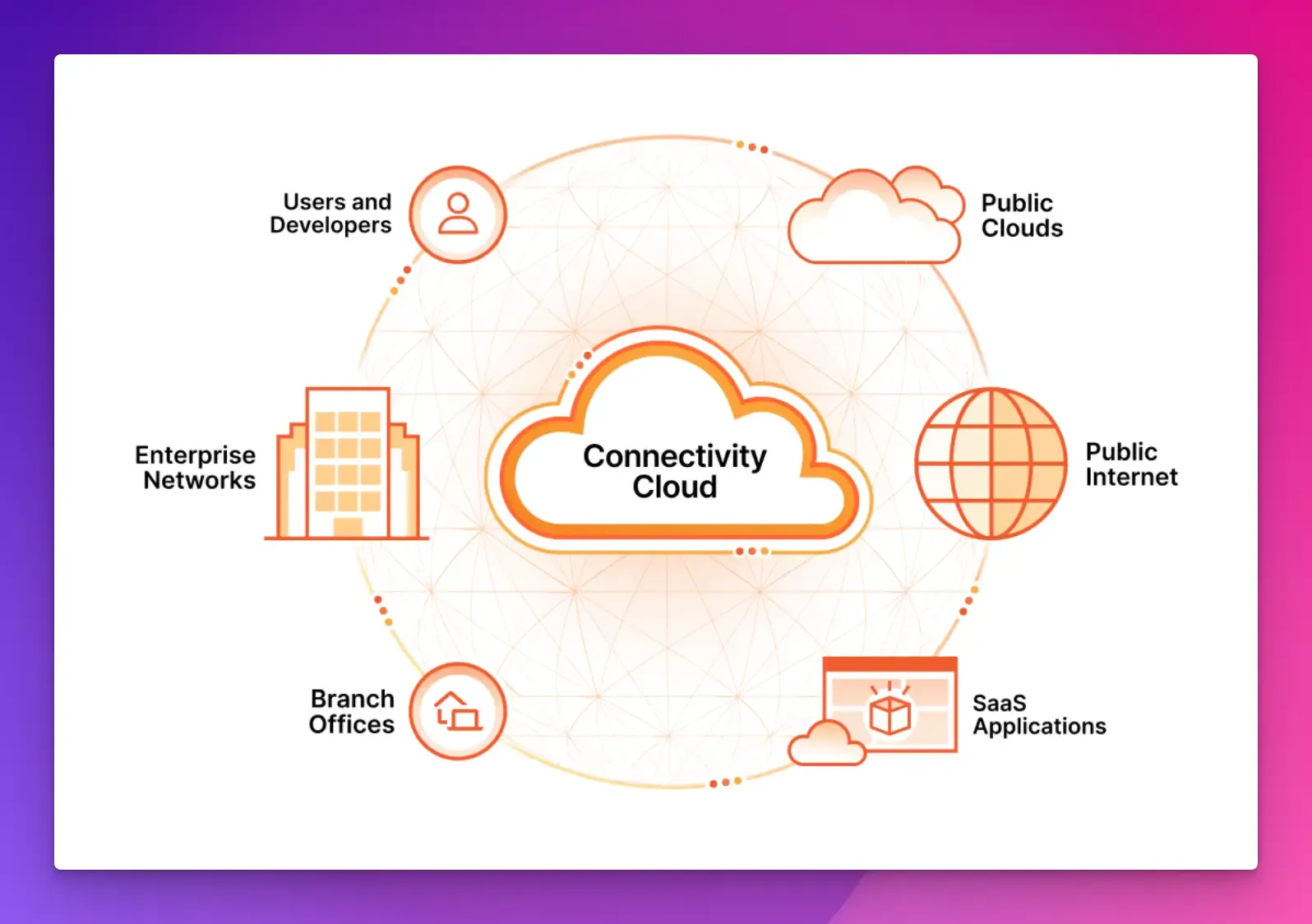
Cloudflare is a global network service provider that offers a range of cloud services to improve the security, performance, and reliability of websites and web applications.
Key features:
- An efficient content delivery network (CDN) is needed to improve load times and reduce latency.
- Global edge network with 300 data centers in more than 100 countries for high availability.
- Powerful application and API security with DNS, DDoS protection, and web application firewall.
- Real-time insights into traffic, threats, and performance metrics.
Best for:
Powerful content delivery with advanced security features.
Pricing:
- Free plan available.
- Pay-as-you-go plan.
Honorable Mentions
- Salesforce Cloud: CRM solutions with cloud services for sales, marketing, and customer service.
- Akamai: Compute storage, networking, and CDN services with global traffic management and advanced security.
- Vultr: Fast and reliable SSD VPS servers with virtual CPUs, bare metal, Kubernetes, storage, and networking solutions.
- HPE GreenLake: Edge-to-cloud platform and as-a-service solutions for hybrid cloud environments.
- OVHcloud: Europe-based cloud platform with high-performance cloud computing, competitive pricing, and European data protection regulations compliance
Further Guides:
If you are interested in learning more about our analysis of development tools, below are some trending lists you can read:
- 7 Best AI tools for developers
- 8 Best Code Sharing tools for developers
- 3 Best Code Snippets Manager with AI Features
snappify will help you to create
stunning presentations and videos.
Final Words
We have listed some of the best cloud service providers with diverse features and pricing plans.
Based on the scale of your operations, budget, and technical requirements, choose the right CSP for your business.
By carefully evaluating each provider’s services, you can make an informed decision that will enhance your business’s efficiency and overall performance.
FAQs:
How do I choose a cloud service provider?
When choosing a cloud service provider, consider pricing, storage options, security features, customer support, and compatibility with your existing IT infrastructure.
What are the challenges associated with using a cloud service provider?
Some challenges of using a cloud service provider include data security concerns, potential downtime, compatibility issues with your existing systems, and regulatory compliance.
How can I ensure cloud security when using a cloud service provider?
To prevent cloud security concerns, implement strong encryption protocols, use multi-factor authentication, and keep all software and applications updated.
